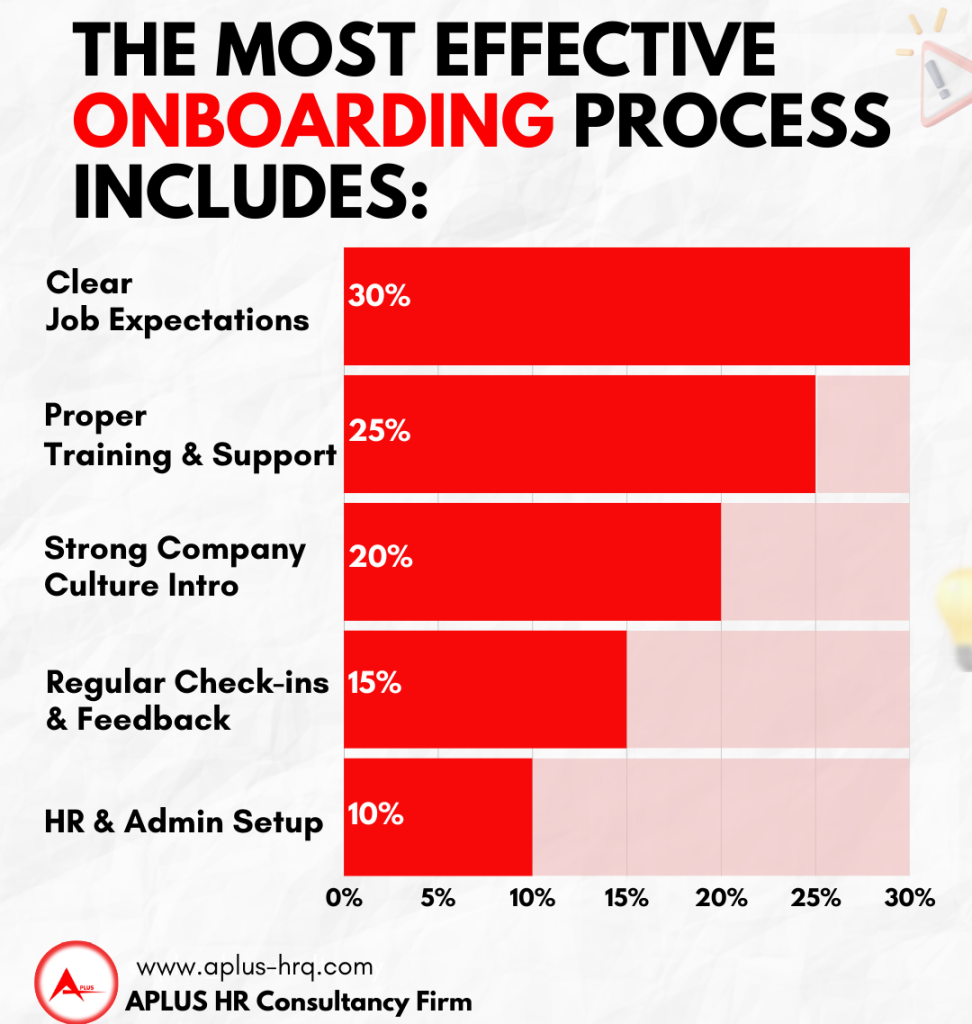Employee onboarding is a crucial process that sets the foundation for success. A well-structured onboarding program helps new hires integrate smoothly into the company, feel confident in their roles, and become productive faster. This guide outlines the key elements of an effective onboarding process and how HR consultation can help businesses improve their onboarding strategies.
Why Onboarding Matters
Effective onboarding leads to:
- Higher employee retention
- Increased job satisfaction
- Faster productivity
- Stronger workplace culture
- Reduced turnover costs
Companies that invest in a strong onboarding process see a significant improvement in employee engagement and long-term success. Studies show that employees who experience a structured onboarding process are 69% more likely to remain with the company for three years. This highlights the importance of creating a seamless and comprehensive onboarding experience.

Key Elements of a Successful Onboarding Process
- 30% – Clear Job Expectations New employees must understand their roles, responsibilities, and performance expectations from day one. Providing a detailed job description and setting measurable goals ensures clarity and alignment with company objectives. A well-defined career progression path also encourages employees to stay motivated and committed to their roles.
- 25% – Proper Training & Support Comprehensive training is essential for employee success. This includes step-by-step guidance, mentoring, and access to resources that help employees build the skills needed to perform their jobs efficiently. Companies should invest in training programs, workshops, and e-learning platforms to ensure continuous development. Assigning a mentor or buddy can also help new hires feel more comfortable and engaged in the workplace.
- 20% – Strong Company Culture Introduction Helping new hires understand and connect with the company’s mission, values, and culture fosters a sense of belonging. Team-building activities, welcome meetings, and open communication contribute to a positive work environment. Encouraging employee participation in company traditions and events strengthens workplace connections and boosts morale.
- 15% – Regular Check-ins & Feedback Frequent check-ins with managers and HR ensure that employees are adjusting well. Constructive feedback and addressing concerns promptly help boost engagement and performance. Managers should schedule one-on-one meetings during the first few weeks and months to discuss progress, challenges, and career aspirations. An open feedback culture builds trust and encourages employees to communicate openly about their experiences.
- 10% – HR & Administrative Setup Ensuring that all paperwork, policies, benefits, IT access, and compliance requirements are completed during the first few days avoids administrative roadblocks and allows employees to focus on their work. Automating onboarding processes with HR software can significantly improve efficiency and reduce paperwork errors. A well-organized HR setup ensures that employees feel supported and can seamlessly transition into their roles.
How HR Consultation Can Improve Onboarding
HR consultation services help businesses design and implement an effective onboarding strategy tailored to their needs. Key benefits include:
- Creating customized onboarding checklists and training programs
- Developing structured orientation sessions
- Implementing employee engagement strategies
- Streamlining HR processes with onboarding software
- Ensuring compliance with labor laws
- Reducing employee turnover through strategic retention efforts
HR consultants bring valuable expertise to organizations, ensuring that onboarding processes are efficient, legally compliant, and aligned with business goals. By leveraging HR professionals’ insights, companies can avoid common onboarding pitfalls and create a positive, lasting impression on new hires.
Final Thoughts
A strong onboarding process directly impacts employee retention, performance, and overall company success. Investing in an effective onboarding strategy can save businesses time and money while fostering a motivated and engaged workforce.
The first few months of a new employee’s journey are critical. Businesses that focus on structured onboarding set their teams up for long-term success, improving overall workplace productivity and employee satisfaction. By prioritizing training, communication, and engagement, companies can create a workplace where employees feel valued and motivated.
Need help improving your onboarding process? Contact us today for expert HR consultation!